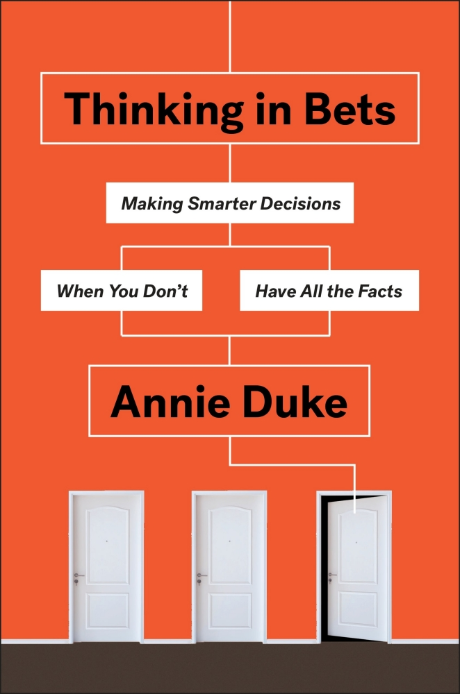
Pause for a minute to envision your best choice in the most recent year. Presently pause for a minute to envision your most exceedingly awful choice.
I'm willing to wager that your best choice went before a decent outcome and the most noticeably awful choice went before an awful outcome.
That is an easy win for me in light of the fact that subsequent isn't simply something we do from a remote place. Monday Morning Quarterbacks are a simple focus, as are authors and bloggers giving moment examination to a mass gathering of people. In any case, as I discovered from my own encounters in poker, coming about is a normal reasoning example that perplexes every one of us. Drawing an excessively tight connection among results and choice quality influences our choices consistently, conceivably with expansive, cataclysmic outcomes.
When I counsel with officials, I once in a while begin with this activity. I request that gathering individuals go to our first gathering with a concise depiction of their best and most noticeably bad choices of the earlier year. I still can't seem to run over somebody who doesn't distinguish their best and most exceedingly terrible outcomes as opposed to their best and most noticeably awful choices.
![hNzI2ZQ.png] ( )
)
In a counseling meeting with a gathering of CEO's and entrepreneurs, one individual from the gathering distinguished terminating the leader of his organization as his most exceedingly awful choice. He clarified, "Since we let go him, the scan for a substitution has been horrendous. We've had two distinct individuals at work. Deals are falling. The organization's not doing admirably. We haven't had anyone come in who really ends up being in the same class as he was."
That sounds like a terrible outcome, however I was interested to test into why the CEO thought the choice to flame his leader was so awful (other than that it didn't work out).
He clarified the choice procedure and the premise of the conclusion to flame the president. "We took a gander at our immediate rivals and similar organizations, and closed we weren't performing up to their level. We figured we could perform and develop at that level and that it was most likely an authority issue."
I asked whether the procedure included working with the president to comprehend his aptitude holes and what he could be improving the situation. The organization had, to be sure, worked with him to distinguish his aptitude holes. The CEO employed an official mentor to work with him on enhancing his authority aptitudes, the central shortcoming recognized.
Likewise, after official instructing neglected to create enhanced execution, the organization thought about part the president's duties, having him center around his qualities and moving different obligations to another official. They dismissed that thought, inferring that the president's spirit would endure, workers would likely see it as a vote of no certainty, and it would put additional budgetary weight on the organization to part a position they trusted one individual could.
At long last, the CEO gave some foundation about the organization's experience making abnormal state outside contracts and its comprehension of the accessible ability. It seemed like the CEO had a sensible reason for trusting they would discover somebody better.
I asked the amassed gathering, "Who thinks this was a terrible choice?" of course, everyone concurred the organization had experienced a keen procedure and settled on a choice that was sensible given what they knew at the time.
It seemed like an awful outcome, not an awful choice. The blemished connection among results and choice quality crushed the CEO and unfavorably influenced consequent choices with respect to the organization. The CEO had distinguished the choice as a slip-up exclusively on the grounds that it didn't work out. He clearly felt a great deal of anguish and lament in view of the choice. He expressed obviously that he figured he ought to have realized that the choice to flame the president would turn out seriously. His basic leadership conduct going ahead mirrored the conviction that he committed an error. He was coming about as well as surrendering to its partner, knowledge of the past predisposition. Knowledge of the past predisposition is the inclination, after a result is referred to, to see the result as having been unavoidable. When we say, "I ought to have realized that would happen," or, "I ought to have seen it coming," we are surrendering to insight into the past predisposition.
Those convictions create from an excessively tight association among results and choices. That is run of the mill of how we assess our past choices. Like the armed force of faultfinders of Pete Carroll's choice to pass on the last play of the Super Bowl, the CEO had been liable of coming about, disregarding his (and his company's) watchful investigation and concentrating just on the poor result. The choice didn't work out, and he regarded that outcome as though it were an unavoidable result instead of a probabilistic one.
In the activity I do of recognizing your best and most noticeably awful choices, I never appear to go over any individual who distinguishes an awful choice where they got fortunate with the outcome, or a very much contemplated choice that didn't work out. We connect comes about with choices despite the fact that it is anything but difficult to bring up undeniable cases where the connection among choices and results isn't so consummately related. No calm individual thinks returning home securely in the wake of driving alcoholic mirrors a decent choice or great driving capacity. Changing future choices in light of that fortunate outcome is unsafe and unbelievable (unless you are thinking this out while alcoholic and clearly beguiling yourself).
However this is precisely the end result for that CEO. He changed his conduct in view of the nature of the outcome instead of the nature of the basic leadership process. He chose he drove better when he was smashed.